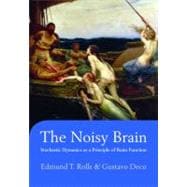
Note: Supplemental materials are not guaranteed with Rental or Used book purchases.
Purchase Benefits
Looking to rent a book? Rent The Noisy Brain Stochastic Dynamics as a Principle of Brain Function [ISBN: 9780199587865] for the semester, quarter, and short term or search our site for other textbooks by Rolls, Edmund T.; Deco, Gustavo. Renting a textbook can save you up to 90% from the cost of buying.
| Introduction: neuronal, cortical, and network foundations | |
| Stochastic neurodynamics | |
| Short-term memory and stochastic dynamics | |
| Attention and stochastic dynamics | |
| Probabilistic decision-making | |
| Confidence and decision-making | |
| Perceptual detection and stochastic dynamics | |
| Applications of this stochastic dynamical theory to brain function | |
| Mean-field analyses, and stochastic dynamics | |
| References | |
| Index | |
| Colour Plates | |
| Table of Contents provided by Publisher. All Rights Reserved. |
The New copy of this book will include any supplemental materials advertised. Please check the title of the book to determine if it should include any access cards, study guides, lab manuals, CDs, etc.
The Used, Rental and eBook copies of this book are not guaranteed to include any supplemental materials. Typically, only the book itself is included. This is true even if the title states it includes any access cards, study guides, lab manuals, CDs, etc.